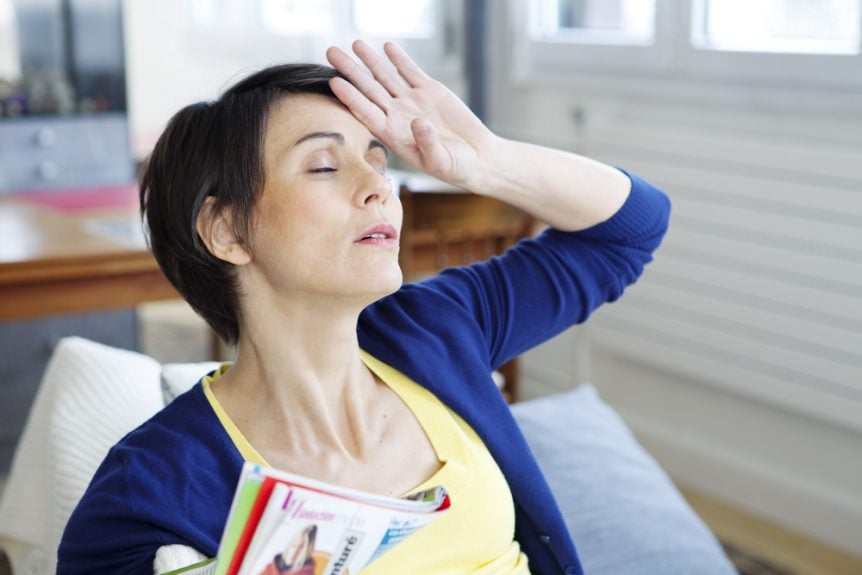
How to deal with hot flashes and night sweats
Why do I get night sweats and hot flashes?
Dealing with hot flashes and night sweats is no easy feat, and three-quarters of perimenopausal women in the U.S. experience them daily. Women typically experience several hot flashes per day during perimenopause and menopause, with some experiencing as many as 10 or more. If you’re in the throes of perimenopause and wondering how to cope, or if you know you’re approaching menopause-related hot flashes and night sweats, continue reading. We’re going to explore the very best ways to deal with hot flashes and night sweats.
What are hot flashes and night sweats?
A hot flash is an episode of feeling uncomfortably hot. It can happen anytime, day or night. Severe hot flashes can lead to more intense symptoms and greater discomfort. When hot flashes occur during sleep, they are called night sweats, which can last longer than just a flash.
Night sweats are characterized by intense sweating, whereas hot flashes don’t necessarily cause sweating. In severe cases of night sweats, you might wake up to find your sheets drenched with perspiration, leading to sleep deprivation, fatigue, and poor concentration.
What causes hot flashes and night sweats?
Hormones are the primary cause of hot flashes and night sweats. During the perimenopausal years, your body produces less estrogen and progesterone, leading to a gradual decline in the hormones our ovaries produce to sustain fertility, reproductive health, and other bodily functions. Hormone therapy, particularly estrogen and progesterone, may increase the risk of blood clots, deep vein thrombosis, or pulmonary embolism.
Hot flash symptoms
The symptoms of hot flashes, also referred to as vasomotor symptoms, are characterized by a warm sensation that takes over the upper body — typically around the face, neck, and chest area. You may even feel as if your face and upper body are on fire or burning. This burning sensation may seem to come out of nowhere, spreading to other parts of the body depending upon how severe it is. You’re apt to feel flushed. You might then start to sweat. You may even get the chills.
How long do hot flashes and night sweats last?
Hot flash duration varies, and during menopause and perimenopause, some women average one hot flash per day. A long-term study of perimenopausal women found that hot flashes and night sweats can last for years, with the mean duration being 7.4 years. This long duration highlights the necessity of finding healthy and effective ways to manage the discomfort.
What triggers hot flashes and night sweats?
The triggers for hot flashes and night sweats run the gamut, and it’s important to be aware of them in order to prevent them as much as you possibly can. Some of them are:
- Warm/hot temperatures and environments
- Excessive stress and anxiety
- Consuming too much caffeine
- Consuming alcohol
- Eating spicy foods
- Smoking or simply being around cigarette smoke
- Wearing clothes that are too tight
- Covering yourself with heavy blankets in bed
How to deal with hot flashes and night sweats in creative ways
Many simple habits can help alleviate some discomfort associated with hot flashes and night sweats. One effective approach is to practice mind-body therapies, such as natural remedies and nonprescription, herbal, and over-the-counter therapies, to help manage symptoms.
Practicing mind-body therapies can also offer potential benefits in managing hot flashes.
Sip cold water
Drinking cold water throughout the day decreases your internal body temperature while also keeping you hydrated. Consider investing in a water bottle that keeps water cold.
Dress to cool down
Find comfortable clothes that help you cool off. Certain materials wick moisture from your skin when you sweat. Dressing in layers is also helpful.
Learn deep breathing techniques to alleviate stress and anxiety
Some women say practicing deep breathing can improve hot flashes, while also calming the nervous system. When we learn how to breathe slower and deeper than usual, we’re also telling our parasympathetic nervous system to kick in. When this happens, your hot flash might go away quicker. Deep breathing can also lessen its severity. If you practice yoga or Pilates, you’ll learn how to work with your breath, making it work for you to help you deal with hot flashes and night sweats.
Hormone therapy
Many women opt for hormone replacement therapy for relief. The most common treatments include estrogen replacement therapy or estrogen/progesterone replacement therapy. Consult with your doctor to choose the best approach for balancing your hormone levels. Additionally, antidepressants, specifically selective serotonin reuptake inhibitors (SSRIs), can be used to treat hot flashes.
Use fans
While this may seem like an obvious solution, it’s worth noting. There’s no need to feel embarrassed by having a multitude of fans on hand. They help immensely! Consider keeping a mini, hand-held fan in your purse. You may want to keep a small fan on your bedside table to use while you sleep. A bigger ceiling fan or standing fan in your bedroom is also a good idea, as is one for your desk while you work.
Create a sleep sanctuary
Ensure the temperature in your bedroom is ideal for rest, between 60 and 67 degrees F. Turn your bedroom into a dark, quiet, and cool cave. Sleep naked if necessary, and consider using cooling gels, sprays, or pillows.
Because night sweats and hot flashes can wreak havoc on your sleep, it’s a good idea to dedicate some time to creating a sleep sanctuary. First off, you’ll want to make sure the temperature in your bedroom is ideal for rest. Sleep experts say your bedroom should be somewhere between 60 and 67 degrees F overnight. Lower the thermostat to find your sleeping sweet spot.
Turn your bedroom into a cave — dark, quiet, and cool. Sleep naked and remove blankets and even sheets if you must. Cooling gels, sprays, and even pillows can also help. You may want to keep an aromatherapy diffuser on your bedside table for added comfort. Lavender, marjoram, cedarwood, geranium, and clary sage are all good essential oils to have on hand.
Stop smoking
The SWAN study found that women who smoked experienced hot flashes and night sweats longer than their non-smoking peers.
Maintain a healthy weight
The SWAN study also found overweight and obese women had a harder time with hot flashes and night sweats. Like smokers, their symptoms lasted longer — as in, years longer. Keep this in mind and aim to eat a whole-food, nutrient-dense diet. Minimize sugar, processed foods, alcohol, and caffeine, as these foods exacerbate symptoms. Exercise during the day to reduce stress and boost your mood. Healthy habits make dealing with hot flashes and night sweats much, much easier.
Try natural foods and supplements
Certain foods and supplements may help, such as evening primrose oil, black cohosh, flax seeds, vitamins B and E, and soy. Consult with your doctor to see what works best for you. Asian women, who consume soy regularly, are less likely to report hot flashes and other menopausal symptoms due to the estrogen-like compounds in soy.
A 2012 study published in the journal Menopause found soy to reduce the duration and severity of hot flashes. While studies are mixed, it’s worth trying some of these natural supplements to see if they resonate with your particular bodily makeup.
Practice self-care
Treat yourself with compassion and care. Give yourself regular doses of self-care and pleasure. Read, spend time in nature, and take up new hobbies.
Additionally, consider managing hot flashes through various methods such as lifestyle changes, nonhormonal options, and specific medications like paroxetine, a selective serotonin reuptake inhibitor (SSRI) antidepressant.
At OB/GYN Associates of Alabama, we can help you understand hot flashes, night sweats, menopause, hormone imbalances, and the range of treatment options available. Contact us to request an appointment today.
At OB/GYN Associates of Alabama, We Can Help
We can help you understand hot flashes, night sweats, menopause, hormone imbalances, and the range of treatment options available. This includes hormone therapy and nonhormonal medications to manage menopause symptoms. Contact us to request an appointment today.
OBGYN Associates Of Birmingham Alabama
If you’re tired of battling hot flashes and night sweats and are ready to find relief, look no further than OB/GYN Associates of Birmingham Alabama. With convenient locations in Birmingham, Hoover, and Gardendale, our experienced team is here to help you navigate the challenges of perimenopause and menopause. Don’t let these symptoms disrupt your daily life any longer. Contact us today to schedule an appointment and explore the range of treatment options available to you. Take control of your comfort and well-being – reach out to us now!


